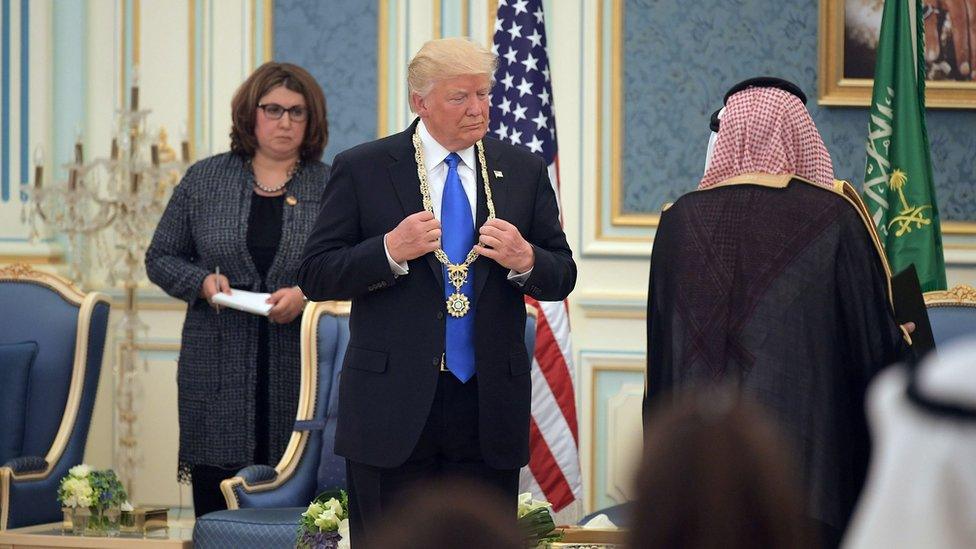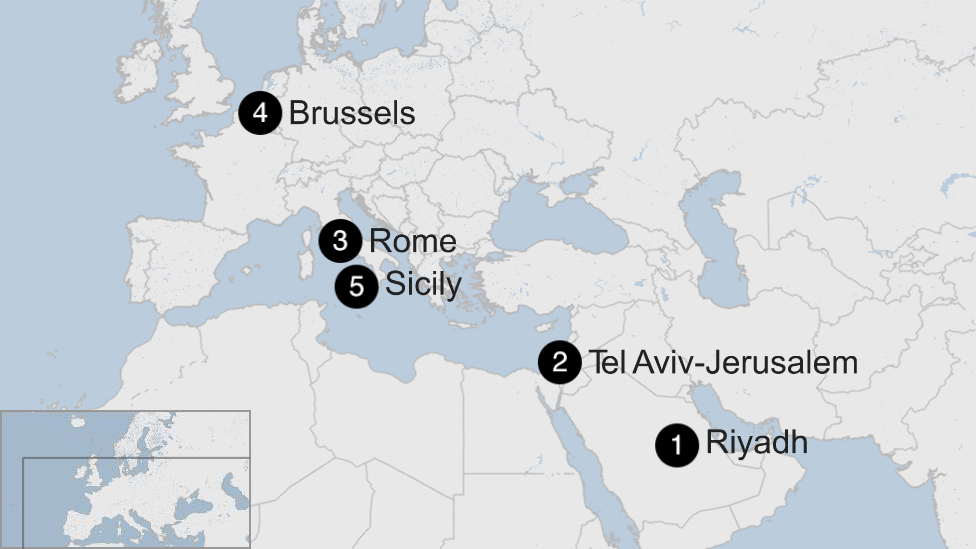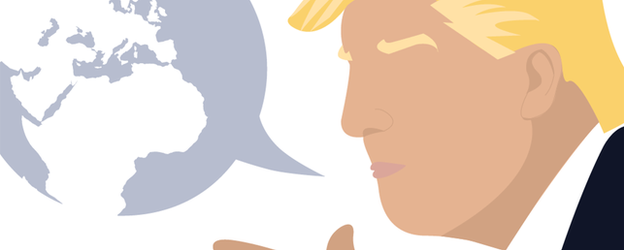Trump in Saudi Arabia: First foreign trip starts as home troubles mount
- Published
Donald Trump sways along with a traditional Saudi sword dance
The US says it has signed deals worth more than $350bn (£270bn) with Saudi Arabia as Donald Trump begins his first foreign trip as president.
The agreements included an $110bn arms deal, which the White House described as the single biggest in US history.
Mr Trump and his wife Melania were greeted in the Saudi capital by King Salman on Saturday morning local time.
The eight-day trip comes as Mr Trump faces uproar at home following his sacking of FBI director James Comey.
It will also take in Israel, the Palestinian city of Bethlehem in the occupied West Bank, Brussels, the Vatican, and Sicily.
US Secretary of State Rex Tillerson said the arms deal was aimed at countering the "malign" influence of Iran.
"The package of defence equipment and services supports the long-term security of Saudi Arabia and the entire Gulf region," he told a news conference in Riyadh.
Mr Trump is accompanied on his visit by his daughter Ivanka, an unpaid White House adviser, and her husband Jared Kushner, a key member of the Trump administration.
Like British Prime Minister Theresa May and German Chancellor Angela Merkel on their recent visits to Saudi Arabia, Mrs Trump and Ivanka Trump did not wear headscarves.
Melania Trump didn't wear a headscarf, but does it matter?
In January 2015, Mr Trump criticised then-First Lady Michelle Obama for doing the same. In a tweet, external, Mr Trump said she had "insulted" her hosts.
On Sunday, Mr Trump will attend the Arab Islamic American Summit in Riyadh and speak about his "hopes of a peaceful vision of Islam". Aides say the president hopes his speech will resonate worldwide and express "a common vision of peace, progress and prosperity".
Mr Trump caused controversy during his campaign by calling for Muslims to be temporarily banned from entering the US over security concerns. Legislation aimed at restricting travel from several Muslim-majority countries remains tied up in the US courts.
Trump's first trip: What's on the agenda in Saudi Arabia?
The summit agenda is expected to focus on combating Islamist militants and the growing regional influence of Iran.
Mr Trump has been a fierce critic of the international deal with Iran which eased sanctions in return for a curb on its nuclear activities.

Mr Trump received Saudi Arabia's highest civilian honour from King Salman (R)
Unlike his predecessor, Barack Obama, he is not expected to highlight human rights during his trip.
In a tweet, King Salman praised Mr Trump, adding that he hoped his visit would "strengthen our strategic co-operation". He later handed the US President Saudi Arabia's highest civilian honour, the King Abdulaziz medal.

Can Trump follow the script? By Lyse Doucet, Chief International Correspondent, in Riyadh
It's being called a summit like no other and in some ways, that's true. Saudis note that past presidential visits were organised by the Royal Court. This time Riyadh is bursting with summits and forums, drawing in all levels of government and everyone from wealthy CEOs, to experts on extremism, to young savvy social media experts.
But behind the hype, there's nervousness too. "We don't talk about an elephant in the room, we call it the elephant in Riyadh," a young Saudi tells me, highlighting the famous unpredictability of the US president when he veers from the official script. This visit is tightly choreographed to minimise that risk.
Saudi Arabia's foreign minister: Donald Trump's visit is a 'coup for peace and coexistence'
And it's not that officials in Riyadh are unaware of the crises roiling Washington. "The Saudis still see him as a president who can and will deliver when it comes to their interests," says one adviser. That's what matters for now. But whether Washington will fully follow the Saudi script for the region still has to be seen.

White House Press Secretary Sean Spicer said, external that Saudi Arabia had signed a deal to buy just under $110bn (£84bn) of American-made arms, which he said was the biggest such deal in US history.
Reuters news agency reports the deal includes the assembly of 150 Blackhawk helicopters in Saudi Arabia, worth about $6bn alone.
AFP quoted a White House official as saying the deal will bolster the kingdom's "ability to contribute to counter-terrorism operations across the region, reducing the burden on the US military to conduct those operations".
Saudi Arabia has been fighting Houthi rebels in neighbouring Yemen since March 2015. The United Nations says about 10,000 people have been killed since the fighting began, with Yemen on the verge of famine.
Rex Tillerson said the arms deal and other investments would add up to more than $350bn.
US giant General Electric said it had signed agreements worth $15 billion, and Saudi oil giant Aramco, had been expected to sign $50bn (£38bn) of deals with 11 US companies.
The agenda for the rest of Mr Trump's trip

Monday-Tuesday, 22-23 May: Tel Aviv and Jerusalem, before visiting the West Bank on Tuesday
Wednesday 24 May: Rome and Brussels. Mr Trump will meet Pope Francis, then Belgian officials
Thursday, 25 May: A Nato summit in Brussels
Friday, 26 May: Sicily, for a meeting of G7 members


Find out which foreign leaders President Trump has met or called since taking office, as well as the countries he has mentioned in his tweets.
